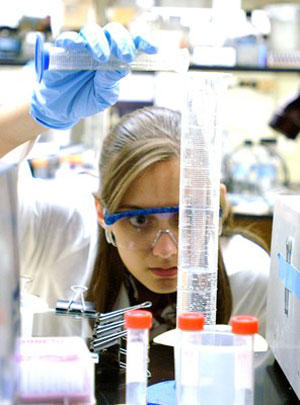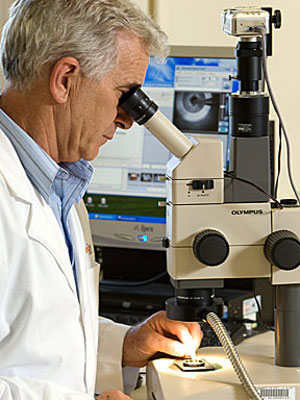Research Chemist
Tasks & duties

Depending on their area of research, chemists may do some or all of the following:
-
develop methods and equipment to study chemical compounds
-
test chemical samples to determine their make-up and properties
-
think of ways to make new chemical compounds
-
work with industries to develop chemical processes
-
carry out experiments
-
write reports on experiments
-
publish articles in scientific journals
-
lecture and supervise students
Specialisations
Research chemists doing basic research investigate the fundamentals of chemistry. Those doing applied research create new products and processes, or improve existing ones, often using knowledge gained from basic research.
Research chemists may specialise in the following areas:
Analytical Chemists
Analytical chemists determine the structure, composition, and nature of substances. They help pharmaceutical industries identify compounds that can be used in drugs, and also identify chemical pollutants in air, water, and soil.
Organic Chemists
Organic chemists study the chemical compounds that make up living things. They mix these chemicals to create new compounds and so develop drugs, plastics, etc.
Inorganic Chemists
Inorganic chemists study chemical compounds other than those in living things, such as batteries.
Physical Chemists
Physical chemists study the physical characteristics of atoms and molecules in chemicals. Their research may result in new and better energy sources.
Materials Chemists
Materials chemists study, develop and improve materials such as plastic.
Biochemists
Biochemists study both biology and chemistry.
Skills & knowledge

Research chemists need to have:
-
knowledge of chemistry and chemical compounds
-
knowledge of how to safely handle, store and produce large quantities of chemicals
-
research skills
-
skill in analysing and interpreting research results and other information
-
problem-solving skills to solve research issues independently
-
practical skills for performing experiments and operating scientific equipment
-
maths and computer skills
-
writing skills, for writing reports and for publications
-
planning and organisational skills
-
communication skills
Entry requirements
To become a research chemist you usually need to have a Masters in chemistry, biochemistry or a related science; however, a PhD and further postdoctoral study is preferred.
To work at the technician level, a Bachelor's degree in chemistry, biochemistry or a related science is often sufficient.
Secondary education
A tertiary entrance qualification is required to enter tertiary training, although an A or B Bursary or NCEA equivalent is preferred. Useful subjects include chemistry, physics, maths with calculus and statistics, biology and English.
Training on the job
Many skills, such as planning experiments, are gained on the job and in the final stages of study. Research chemists often attend professional development courses and conferences to keep up to date with latest developments in the chemistry field.
Useful experience
Useful experience for research chemists includes laboratory work as a chemical technician, or other scientific work.
Related courses
Inorganic Chemistry
Laboratory Technology
Organic Chemistry
For more information, please refer to Career Services.
Document Actions
